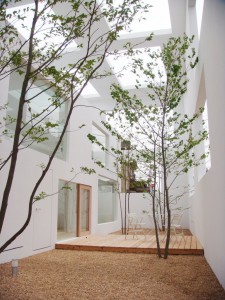 To understand the relational logics that Advanced Architecture establishes with the environment I analyzed the Fujimoto’s N house and the Lally’s text The shape of energy. Both of them clearly traduce the importance of the interaction that architecture has to develop with the ecosystem in order to design a spatial solution that has to be in harmonic relation with the environment. Architecture, since times, has developed projects in contiguity relationship with nature but in most of those examples, the common task is the use of materiality as isolation among life-space and its surrounding. Fujimoto develop the idea of continuity perception among the domestic space and its “outside” thanks to the interconnected layers designed using the idea of the nest. In order to create a gradation of domain Fujimoto applies the strategy of shells, three, one into the other, characterized by the decrease of atmospheric relation given by architectural strategies. For example the holed roof interacts with the changing light-intensity and the windows reflect and amplify the nature but at the same time, help to keep a more private space which looks to the outward. The outermost part is an example of disturbing relation because is characterized by the alteration of the order of elements: this “semi-indoor garden” has trees which become domestic elements that build the spatiality adding new parameters at the architecture: Time. In The shape of Energy, Lally, underlines that Advanced Architecture works with intangible relation of feelings that are able to design the ecology system without physical boundaries. The relation with space is flexible, architecture must amplifies the characteristics and the properties that it shares with the surrounding: it means designing with material composition to amplify the energy and make a shape detectable not only by visible spectrum but also through other sensory perceptions. The control of the energy is far from the geometry rules applied to the solid-state construction; if we work with the intangible, we must know that material energies change according to the atmospheric variation. Architecture achieves a new dynamic form, its boundary becomes the whole ecosystem. Therefore, according to the examples analyzed, relational logics enable to connect the architecture with the multiple environments thanks to system that the design establishes with the elements of the surrounding. Architecture is most advanced if is able to generate a dense network of relations between the environments that are not only physical, they are emotional and sensory too. The topic that I would like to develop in my future research is the use of existing and designed nature in architecture to generate different kind of relation between space and environment. The use of nature, indeed, can help to design flexible boundaries far from the concept of enclose and separation spaces and projected to the achievement of a filled perception of the outward. Case Study_House N, Sou Fujimoto Text Assignment_The Shape of Energy, Sean Lally
To understand the relational logics that Advanced Architecture establishes with the environment I analyzed the Fujimoto’s N house and the Lally’s text The shape of energy. Both of them clearly traduce the importance of the interaction that architecture has to develop with the ecosystem in order to design a spatial solution that has to be in harmonic relation with the environment. Architecture, since times, has developed projects in contiguity relationship with nature but in most of those examples, the common task is the use of materiality as isolation among life-space and its surrounding. Fujimoto develop the idea of continuity perception among the domestic space and its “outside” thanks to the interconnected layers designed using the idea of the nest. In order to create a gradation of domain Fujimoto applies the strategy of shells, three, one into the other, characterized by the decrease of atmospheric relation given by architectural strategies. For example the holed roof interacts with the changing light-intensity and the windows reflect and amplify the nature but at the same time, help to keep a more private space which looks to the outward. The outermost part is an example of disturbing relation because is characterized by the alteration of the order of elements: this “semi-indoor garden” has trees which become domestic elements that build the spatiality adding new parameters at the architecture: Time. In The shape of Energy, Lally, underlines that Advanced Architecture works with intangible relation of feelings that are able to design the ecology system without physical boundaries. The relation with space is flexible, architecture must amplifies the characteristics and the properties that it shares with the surrounding: it means designing with material composition to amplify the energy and make a shape detectable not only by visible spectrum but also through other sensory perceptions. The control of the energy is far from the geometry rules applied to the solid-state construction; if we work with the intangible, we must know that material energies change according to the atmospheric variation. Architecture achieves a new dynamic form, its boundary becomes the whole ecosystem. Therefore, according to the examples analyzed, relational logics enable to connect the architecture with the multiple environments thanks to system that the design establishes with the elements of the surrounding. Architecture is most advanced if is able to generate a dense network of relations between the environments that are not only physical, they are emotional and sensory too. The topic that I would like to develop in my future research is the use of existing and designed nature in architecture to generate different kind of relation between space and environment. The use of nature, indeed, can help to design flexible boundaries far from the concept of enclose and separation spaces and projected to the achievement of a filled perception of the outward. Case Study_House N, Sou Fujimoto Text Assignment_The Shape of Energy, Sean Lally